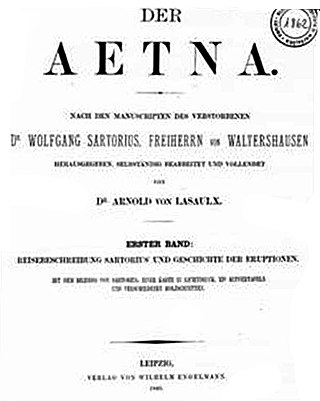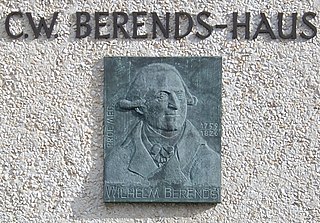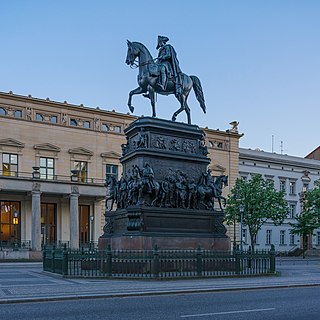Related Research Articles

Friedrich August Gotttreu Tholuck, known as August Tholuck, was a German Protestant theologian, pastor, and historian, and church leader.

Julius Müller was a German Protestant theologian.

Otto Jahn, was a German archaeologist, philologist, and writer on art and music.

Ernst Louis Étienne Laspeyres was a German economist. He was Professor ordinarius of economics and statistics or State Sciences and cameralistics in Basel, Riga, Dorpat, Karlsruhe, and finally for 26 years in Gießen. Laspeyres was the scion of a Huguenot family of originally Gascon descent which had settled in Berlin in the 17th century, and he emphasised the Occitan pronunciation of his name as a link to his Gascon origins.

Wilhelm Scherer was a German philologist and historian of literature. He was known as a positivist because he based much of his work on "hypotheses on detailed historical research, and rooted every literary phenomenon in 'objective' historical or philological facts". His positivism is different due to his involvement with his nationalist goals. His major contribution to the movement was his speculation that culture cycled in a six-hundred-year period.

Karl Heinrich Emil Koch was a German botanist. He is best known for his botanical explorations in the Caucasus region, including northeast Turkey. Most of his collections have today been lost. He is also known as the first professional horticultural officer in Germany.
Gottschalk Eduard Guhrauer was a German philologist and biographer. He is known principally for his 1842 biography of Gottfried Wilhelm Leibniz and his completion (1853) of Theodor Wilhelm Danzel's biography of Lessing, G. E. Lessing, sein Leben und seine Werke.

Arnold Constantin Peter Franz von Lasaulx was a German mineralogist and petrographer.
Felix Liebrecht was a German folklorist.

Georg Otto August Wissowa was a German classical philologist born in Neudorf, near Breslau.

Carl August Wilhelm Berends was a German physician born in Anklam, Pomerania.

Alexander Georg Supan was an Austrian geographer.
Alwin Schultz was a German art historian and medievalist, professor of art history at the Charles University in Prague.
Heinrich Häser was a German medical author.
Heinrich Friedrich Franz Körte was a German natural and agricultural scientist, and for thirty years Professor of Natural Sciences at the Agricultural Academy in Möglin, which was founded by Albrecht Daniel Thaer.

The equestrian statue of Frederick the Great on Unter den Linden avenue in Berlin's Mitte district commemorates King Frederick II of Prussia. Created from 1839 to 1851 by Christian Daniel Rauch, it is a masterpiece of the Berlin school of sculpture, marking the transition from neoclassicism to realism. The bronze statue shows "The Old Fritz" dressed in military uniform, ermine coat and tricorne hat on horseback above the leading generals, statesmen, artists and scientist of his time. Walled in during World War II, it was disassembled by East Germany in 1950, reassembled in Sanssouci Park in 1963, and returned to its original location in 1980.

Johann Eduard Wappäus was a German geographer. He was a son-in-law to mineralogist Johann Friedrich Ludwig Hausmann.

Sigismund Friedrich Hermbstädt was a German pharmacist and chemist who wielded great influence on the improvement of science education for pharmacists. He also made numerous contributions in the fields of industrial and agricultural chemistry.

Ernst Friedrich Theodor Lindner was a German historian.

Max Ring was a German physician, novelist, poet, and dramatist.
References
- This article incorporates text from a publication now in the public domain : Gilman, D. C.; Peck, H. T.; Colby, F. M., eds. (1905). . New International Encyclopedia (1st ed.). New York: Dodd, Mead.